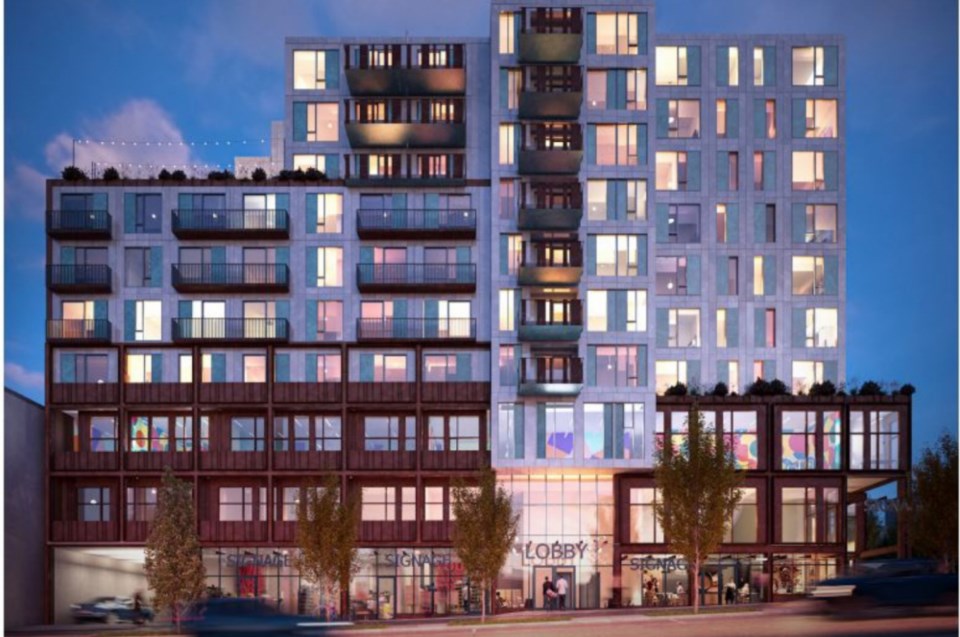The rising cost of mass timber was a key obstacle to using the climate-friendly construction material during a panel discussion the B.C. chapter of the Urban Land Institute hosted this past spring.
Now, one Vancouver developer is setting aside plans to use mass timber in two rental projects in favour of concrete after upwards of three years of planning.
“We were just at the point where it was becoming very challenging to move forward where costs were fluctuating the way they were,” said Zack Ross, president of the Cape Group in Vancouver. “We had a building being designed, and then the period of time it took to get the permitting, the whole circumstances of the market changed.”
Prices for mass timber – a dense, fire-resistant building material touted as an alternative to concrete – have shifted by as much as $1,000 a foot over the past two years, he said. This compares to pricing of about $500 a foot over the course of the previous decade.
According to Cape Group’s website, The Sophia, at East 1st and Scotia Street on the False Creek Flats, is to have 112 rental units, with 4,500 square feet of commercial space and a 56-space daycare.
“Mass timber construction will be used for the residential portion of the project, lowering the building’s carbon footprint, reducing construction time, and providing superior energy performance,” a project description says.
Now, it will be built using concrete when construction begins in early 2023.
The Raphael, at 338 East 2nd Avenue, was to provide 95 rental units including 54 units for artists. Cape Group told the city during the approvals process that it would use mass timber, “reaffirming the project team’s commitment to build with a renewable building material.”
Now, it too will be built using concrete – and a new application will be submitted because the city decided to include it within the Broadway Plan after telling Cape Group it would not be included.
Cape Group plans to revamp the design to deliver at least 190 rental units on the site. Details are still under discussion with the city.
A third rental building at Charles and Nanaimo was never officially designated for mass timber construction, but it will not be using the material now, either.
The shifts illustrate the challenges Ross outlined when he spoke as part of an Urban Land Institute panel on April 5.
“The structure of a building is one of the most important decisions you can make at a very early stage of the design,” Ross said at the time. “You have to take a best guess, and sometimes you get lucky and sometimes you get stuck.”
Stable costs and a reliable supply chain are critical to making projects work, and in the case of mass timber, that hasn’t been the case over the past two years.
“It’s really important to have some kind of cost certainty,” he said. “And if you don’t have a logistics network set up to actually get the product from the facility to the actual building site, there’s just no reason to do it. It doesn’t become economic, it doesn’t become feasible or practical.”
He reiterated that point this week.
“As much as a private developer would love to have fun, it has to make sense for financial institutions to lend on them so you can actually build these projects,” he said. “If they don’t make sense financially, we just can’t do it, even if we really, really, really want to.”
Cape Group continues to look for opportunities to incorporate mass timber in its projects. Key criteria include a stacked structure, a stable cost environment and a consumer willing to pay for what mass timber offers.
“This isn’t us saying ‘no’ to mass timber at all,” he said. “We’re still actively looking to do mass timber on other sites.”
Developers such as Adera Development Corp., which have had a long-term interest in mass-timber and worked closely with local manufacturer Structurlam, has no plans to pare back its use of mass timber.
It recently announced plans for two new projects in Surrey and Coquitlam that will incorporate its proprietary and locally engineered SmartWood materials.
Pura, is a 248-unit condo project that claims to be Surrey’s first mass-timber community. SoL will deliver 92 market units to the Coquitlam market and neighbours Red SoL, a 109-unit rental development.



